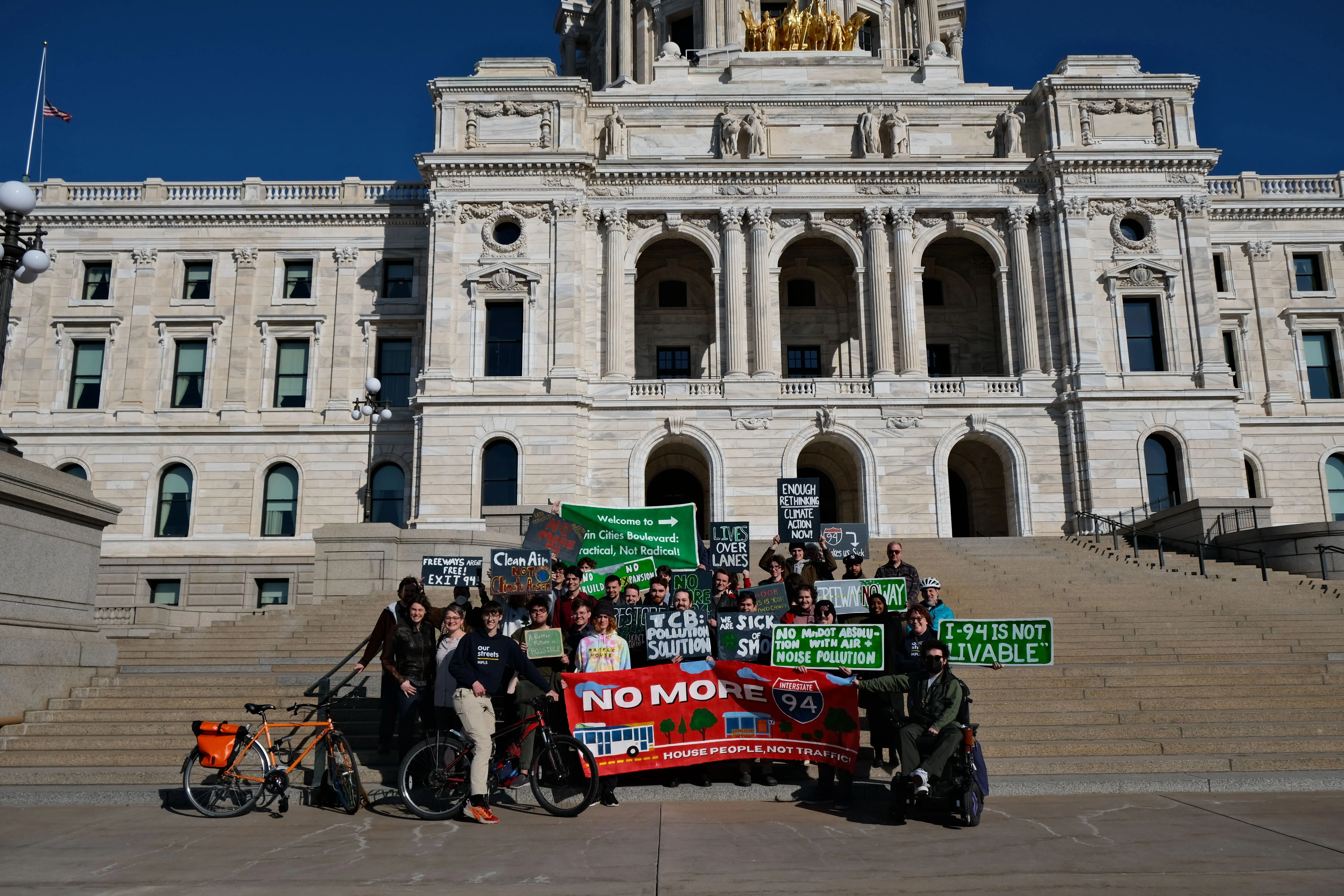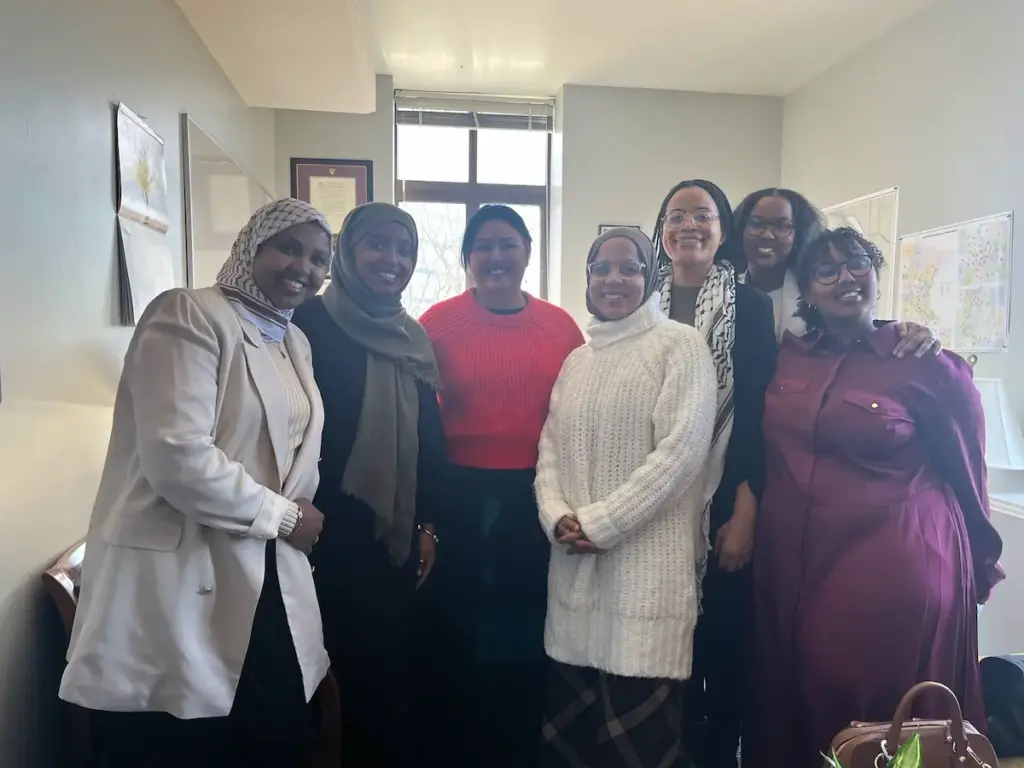
Together, we made progress in all of our legislative priorities this year and will continue to advocate for transportation reforms that did not move forward in 2025.
Cumulative Impacts for Transportation
Senate, SF 4676 | House, HF 4627
IN PROGRESS
Thanks to community support, we made progress in the fight to protect environmental justice communities from harmful highway projects. Our bill, the cumulative impacts law for transportation, was introduced in both the House and the Senate with multiple authors in both chambers. The bill also received an informational hearing in the House, where community members and advocates discussed the many ways that highways harm marginalized communities and why existing protections do not go nearly far enough to ensure that every neighborhood has access to clean air and healthy communities.

Unfortunately, MnDOT pushed back with bad faith objections intended to slow the bill’s progress. The Transportation Committee Chairs (Representative Frank Hornstein and Senator Scott Dibble) used this as an excuse to block the bill from passage this year. We plan to continue to work alongside our coalition partners, including Jewish Community Action, RISE, Ayada Leads, and the MN Environmental Justice Table, to pass the transportation cumulative impacts law in 2025.
Community Preferred Alternative Act
Senate, SF 4677 | House, HF 4646
IN PROGRESS
Currently, impacted communities have little control over major highway projects that divide and pollute their communities. We are organizing to pass the community-preferred alternative act to address this. The bill would require MnDOT to establish a committee of local elected leaders for major highway projects and obtain majority approval before the project can begin construction.
We made progress; however, more work remains. The community-preferred alternative act was introduced in both the House and the Senate. Unfortunately, the bill did not receive a hearing in the transportation committees and was not included in the omnibus transportation bill. We plan to continue to organize alongside impacted communities, including those impacted by the proposed Highway 252 expansion, to ask transportation committee members to commit to passing this law in 2025.
Strengthen Greenhouse Gas Protections for Major Highway Projects
Senate, SF 5099 | House, HF 4988
PASSED
Following the passage of the 2023 transportation funding bill, Our Streets raised concerns that a new law requiring MnDOT to reduce greenhouse gas emissions in new highway projects included a major loophole: it only applied to expansion projects. Thankfully, thanks to public pressure, this critical climate law was strengthened during the 2024 session. Now, before a major highway project can be added to MnDOT’s funding plan, MnDOT must conduct an analysis to determine if its planned portfolio of projects is in line with the State’s goals to reduce carbon emissions and vehicle miles traveled (VMT). This law now applies to all projects, not just those that add lane miles. This will ensure that MnDOT is required to address climate impact in future projects like Rethinking I-94.
Reform Speed Limit Implementation
Senate, SF 4783 | House, HF 4168
PASSED
Progress was made on reforming the way that MnDOT sets speed limits to conform with new federal guidelines. The Federal Highways Administration (FHWA) recently released the newest Manual on Traffic Control Devices (MUTCD) version. The new guide includes more progressive guidelines for street design and speed limit implementation that better consider safety and accessibility for people walking, rolling, and biking. We successfully organized for a bill that requires MnDOT to use the new federal guidelines for setting speed limits until the state version of the MUTCD is updated. This will result in safer speed limits and street design throughout the state.
Unfortunately, a concerning provision was also added to the omnibus transportation bill which requires MnDOT to evaluate city speed limits and recommend potential increases.
Olson Memorial Highway Safety Improvements
IN PROGRESS
We continue to organize to fund and implement immediate design changes and safety improvements on Olson Memorial Highway. While MnDOT is reimagining the highway’s long-term future, there is still an urgent need to improve its safety and accessibility now to prevent additional tragedy.
Thanks to community support and the leadership of Rep. Agbaje, bills were drafted to lower the speed limit on Olson Memorial Highway to 25 MPH and fund additional safety improvements, including further narrowing crossing distances, improving street lighting, converting a traffic lane into a bus lane, and adding a protected bike lane. Unfortunately, Senator Bobby Joe Champion declined to sign on to the legislation, and it did not advance this year. Moving forward, we will continue to organize to ask MnDOT to respond to community calls for action and commit to lowering the speed limit on Olson and funding safety improvements this year.
Define Highway Purpose to Include All Modes of Transportation
IN PROGRESS
A provision defining highway purpose to include all modes of transportation, not just personal vehicles, was initially included in the omnibus transportation bill but was later stripped by Transportation Committee Chairs Frank Hornstein and Scott Dibble following pushback from MnDOT.
The state’s new greenhouse gas protections for highway projects require a climate impact assessment of new highway projects before they can be added to the state’s funding plan. If it is found that the project is not compatible with state climate goals, MnDOT must either change the project or invest in mitigation efforts, like walking, biking, and transit improvements, to offset the increase in emissions. However, because the Minnesota constitution requires that trunk highway dollars be spent on “highway purposes”, and no action has been taken to clarify that highway purpose includes those mitigation projects, the ability to reallocate funding to walking, biking, and transit is severely limited.
A provision to address this by defining highway purpose to include all modes of transportation, not just personal vehicles, was initially included in the omnibus transportation bill but was later stripped by Transportation Committee Chairs Frank Hornstein and Scott Dibble following pushback from MnDOT and the highway lobby. Moving forward, we will seek to fix the definition of highway purpose in 2025.
Asphalt Art Pilot Program
IN PROGRESS
Bill language to create a life-saving asphalt art pilot program was created but not formally introduced. In 2025, we will be seeking additional authors and passage.
Study a Regional Bike-share Program
IN PROGRESS
Bill language to study regional bikeshare in the Twin Cities was drafted but not introduced in 2024. A regional bike-share system would create affordable access to bike-share across the Twin Cities, filling the hole left by Nice Ride’s departure. Such a study would be an opportunity to evaluate innovate programs in other cities, like in Indianapolis, which recently made its e-bike share program free to all residents. Moving forward, we will continue to seek out coalition partners to help advance this bill in 2025.
Vehicle Weight Regulation
IN PROGRESS
Omar Fateh introduced a bill to regulate heavy and oversized vehicles; however, Transportation Committee Chair Scott Dibble did not give the bill a hearing and was not introduced in the House.
The bill would collect fees on dangerously heavy or oversized vehicles, and use the revenue to increase funding for existing pedestrian safety and safe routes to schools programs. One obstacle we will be working to address this summer is to determine if there are barriers preventing vehicle registration fees from being spent on those programs. Potential solutions include either amending highway purpose to allow for more funding flexibility, or amending the vehicle weight regulation law to not direct revenue to a specific source.
State Legislative Priorities
Review our legislative priorities in detail.